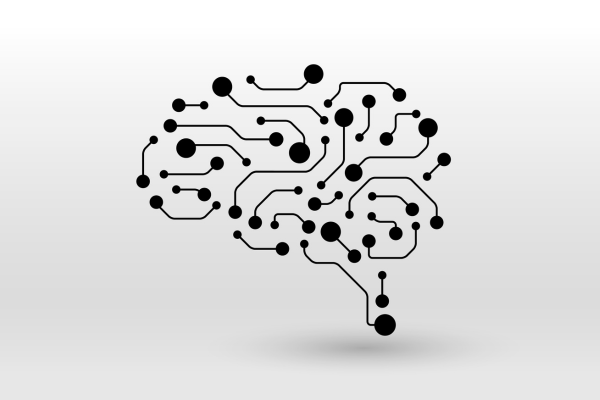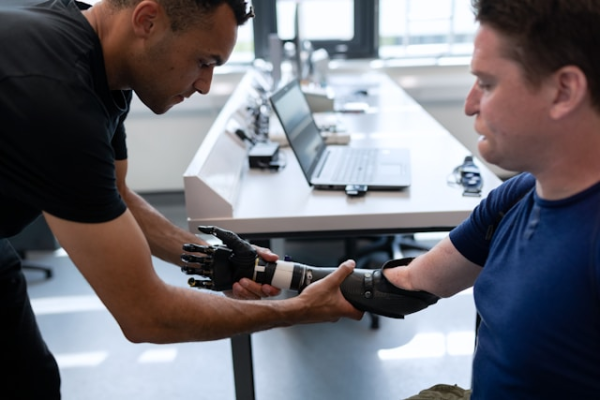How Can AI Help the Recruitment Industry?

Artificial Intelligence (AI) promises to be the next big technological leap in society, providing us with innovative tools to automate, optimise and streamline how we work. This new technology has already shown promise in the recruitment industry, where the demand for efficient, effective, and fair recruitment practices is exceptionally high. Healthcare recruitment in particular stands to benefit greatly from this new technology, as it can make the job of sourcing, selecting and vetting healthcare candidates through the recruitment pipelines with ease. So, in this article, we’ll look at how AI is going to help the recruitment industry by making life easier for clients, candidates and recruiters alike.
What is AI in Recruitment?
AI in recruitment involves the use of machine learning algorithms, natural language processing, and other AI technologies to optimise and streamline the hiring process. AI transforms traditional recruitment methods by automating tasks, enhancing decision-making, and improving interactions between employers and candidates. This technology assists in various stages of recruitment, from sourcing and screening candidates to final selection and onboarding, bringing efficiency and precision that were previously unattainable with manual processes alone.
How AI Will Help Healthcare Recruitment
Healthcare recruitment is a little more nuanced than generalist recruitment, as candidates must hold relevant qualifications and regulatory registrations. For employers, onboarding is typically more involved too and there will be a need for various checks to make sure candidates are legally capable of performing their duties. The issue gets even more complex as the industry as a whole is pivoting towards more international hires. AI looks to make this whole process easier for everyone involved, so let’s look at how this will work:
Streamlining Candidate Sourcing
Traditionally, sourcing candidates in the healthcare industry has relied heavily on manual processes such as sifting through job boards, utilising personal networks, and posting adverts on multiple platforms. These methods are often time-consuming and may not always reach the most suitable candidates. Moreover, the vast amount of data generated by these conventional methods can be overwhelming and difficult to analyse effectively.
AI can significantly enhance sourcing efficiency through advanced techniques like data mining and predictive analytics. By leveraging vast databases and employing sophisticated algorithms, AI can identify patterns and predict which candidates are most likely to succeed in a role. This helps to speed up the sourcing process and also ensures higher quality candidates are considered. Tools such as LinkedIn’s Recruiter tool offer AI-driven solutions to help recruiters identify and engage potential candidates more effectively.
Improving the Quality of Hires
AI's role in CV screening and candidate selection is transformative and a huge time saver. Traditional CV screening processes have a reputation for being labour-intensive as well as prone to human error and bias. AI systems use natural language processing (NLP) to analyse and compare CVs at scale, ensuring that candidates who meet specific qualifications are not overlooked due to human bias or error.
Moreover, AI has the potential to reduce unconscious bias in candidate selection. By standardising the screening process and focusing on skills and experiences relevant to the job, AI can help create a more equitable recruitment process. AI-driven assessment tools like Pymetrics assess candidates’ skills and personalities through games and tasks that predict job success without cultural, educational, or socioeconomic bias. This process improves the diversity of candidates by removing human bias, which can greatly benefit employers.
Improving the Candidate Experience
Candidate experience is another important part of the recruitment process. It can influence an applicant's perception of the healthcare organisation and their likelihood of accepting a job offer. AI can significantly improve this aspect by facilitating personalised interactions and speedy communication. AI-powered chatbots, for instance, can provide immediate responses to candidates’ inquiries, schedule interviews, and give feedback, enhancing the overall candidate experience.
Organisations like Nomad Health have utilised AI chatbots to connect candidates from across the globe and provide a seamless interaction that maintains engagement without requiring constant attention from human recruiters.
Increasing Operational Efficiency
Recruitment involves numerous administrative tasks such as scheduling interviews, sending out communications, and managing databases. AI can automate many of these repetitive tasks, allowing human recruiters to focus on more strategic activities such as candidate engagement and decision-making.
The automation of these tasks can save recruiters time, but it has the added benefit of potentially reducing costs and improving scalability. As AI tools learn and adapt, they can handle increasing volumes of work, making recruitment processes more efficient and less prone to errors.
Ethical Challenges for AI in Healthcare Recruitment
Despite the benefits, the use of AI in recruitment raises several ethical concerns, particularly around privacy, data security, and the potential for algorithmic bias. Ensuring that AI systems are transparent and their decisions can be explained is key to maintaining trust and fairness in recruitment processes. To counter this concern, proper installation and training for these applications is a must.
Regulatory considerations are also a big issue in healthcare recruitment, as data protection and privacy are governed by strict laws such as the GDPR. Recruiters must ensure that AI tools comply with these regulations to protect candidate data and prevent misuse.
AI Looks to Level Up the Recruitment Industry
AI holds tremendous potential to revolutionise the recruitment industry as a whole, but healthcare recruitment in particular could see huge benefits. These new digital tools aim to enhance efficiency, fairness, and strategic focus for recruiters working in the healthcare industry. However, this new technology must be balanced with careful consideration of ethical issues and regulatory compliance to fully realise its benefits while maintaining trust and integrity in the recruitment process.
If you’re interested in working in healthcare recruitment to harness these revolutionary new tools, then our team at Globe Locums would love to hear from you. Find out what it takes to work with us here or get in touch if you have any questions.

Candidate Registration
Registering with Globe couldn't be easier. Simply fill in the form below and one of our experienced recruitment professionals will contact you within 24 hours





